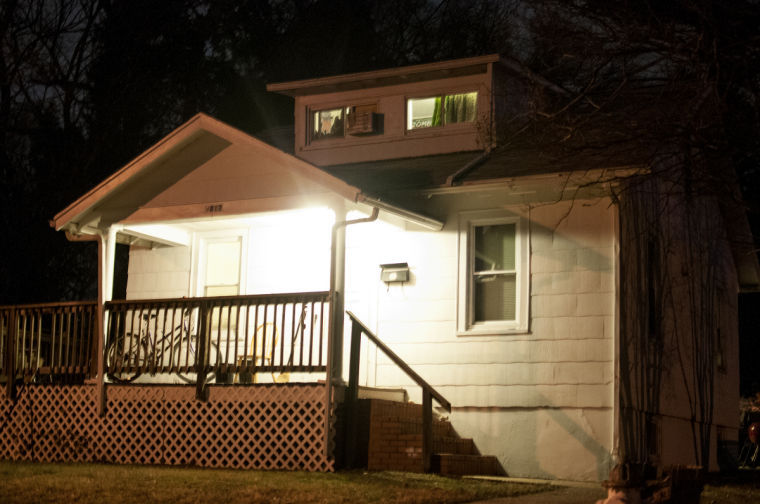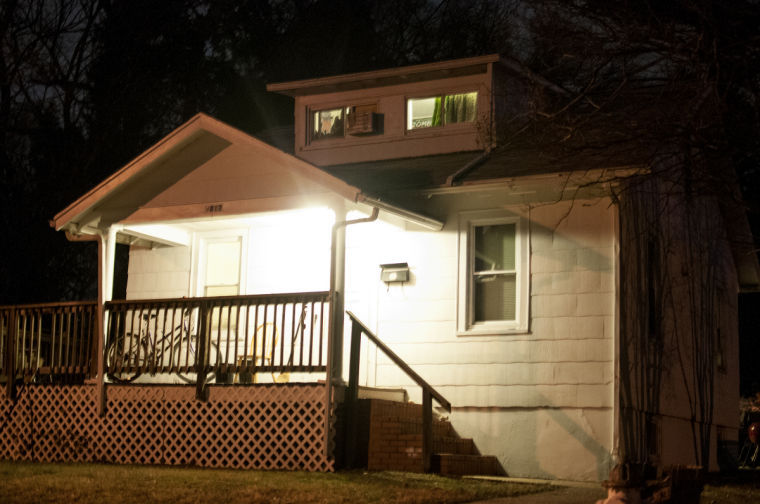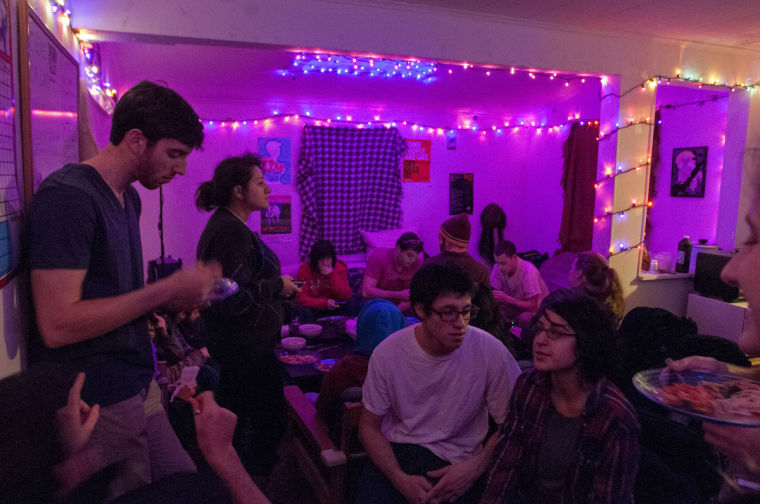While some might consider eating off another’s plate bad manners, students actually encourage the practice at meals in this university’s CHUM houses.
Sunday evening, about 25 students met in an off-campus house for a potluck, one of many traditions shared by students in Co-op Housing University of Maryland. They now occupy six College Park houses, and the demand is only growing — the community had to turn people away for the first time this year, said Susan Nembhard, a junior criminology and criminal justice major. They received 36 applications for only 14 spots, she said.
Sitting under the glow of rainbow Christmas lights Sunday, the group shared a pan of lasagna in the house’s small living room. They call the house “The Pod,” in honor of a former resident who loved to play CDs of whale sounds, said sophomore neurobiology major Rebekka Paisner. As Paisner took a bite of her lasagna, her friend stabbed another piece on her plate and brought it to his mouth.
“We all try to work together — and, hence why someone is eating my food right now, we all share everything,” Paisner said with a laugh.
The cooperative started in 2010 from an idea in former student Rachael Maddox’s senior thesis, which detailed the problems with large housing corporations and proposed setting up a cooperative system. For students, it’s an affordable alternative to traditional housing, where residents share weekly chores and the cost of rent, utilities and groceries. Decisions are made by consensus at community meetings, and each house delegates two residents a day to cook dinner.
Despite the community’s recent growth, the group is still 10 to 15 years away from their ultimate goal of owning their own houses, Nembhard said.
CHUM tries to be a low-income housing provider, said Richard Higgins, a junior biology and computer science major, but it has become difficult since the College Park City Council suspended rent stabilization in July. Rents increased without the caps that kept the prices for single and double family homes low, but the demand for houses is so high that students are willing to shell out the extra cash.
“There’s no longer any incentive for [landlords] to sell,” Higgins said.
Still, CHUM houses are more affordable than most other off-campus options — each person pays about half the price of a University View apartment, Nembhard said. Paisner said she pays $300 a month, including utilities. And members cite the friendly, open atmosphere as a huge draw to live in CHUM.
“It’s infinity times better than a dorm,” said sophomore electrical engineering major Austin, who identifies only by last name. “There’s a sense of respect here and mutual understanding that’s not in the dorms. And I feel like everyone here is here for a purpose, and that purpose is to contribute to the community.”
Each wall is a different color in the Crow’s Nest house, which students named after finding the last tenant’s collection of stuffed Halloween crows in the basement. A “chore wheel” on the wall assigns each resident to weekly tasks, such as cleaning the kitchen floors. Each resident has a homemade, brightly decorated mailbox, and a whiteboard delegates the week’s cooking duties.
The room is a bit in disarray, with boxes everywhere, as house members organize their belongings.
“We’re spring-cleaning,” Nembhard said.
Although Nembhard moved in just a few months ago, she said her house already feels like a family — the six members of her house woke up together at 10:30 a.m. to cook brunch.
CHUM is a “safe place” where all can be accepted, regardless of their gender, sexual orientation, race or interests, Paisner said. Members also know how to have fun — along with the weekly Sunday potlucks, they have an annual “CHUMsgiving” dinner and have played a community-wide game of Assassins.
“Everyone is so bright, but at the same time they don’t lose sight that life isn’t linear, about going to college, get a job,” Paisner said. “Like some people think getting drunk is the opposite of going to school, but when we get drunk, we talk about school, things we learned.”
Once, the Crow’s Nest housemates tried to get into a strip club. Another night, they walked around an abandoned tuberculosis hospital in Ellicott City. They also go dumpster diving at Trader Joe’s in the middle of the night to search for prepackaged food the store has thrown away.
“We had this really good pie the other day — it was all-natural, berry pie,” Paisner said.
In a city where Nembhard said most residents are “anti-student,” CHUM members try hard to be good neighbors, said Mia Zavalij, a senior anthropology major.
The College Park City Council put rent stabilization on hold so it could try to address the friction between students and long-term residents, said Patrick Wojahn, District 1 councilman. Cooperative houses, especially if the students own them, could help mitigate those tensions stemming from partying, vandalism and code violations, Wojahn said.
“I went to school at the University of Wisconsin-Madison, and I think it really was a benefit to the community because the housing cooperatives built up a culture and brought the larger community in,” Wojahn said. “When students are co-owners of property, they have more of a stake in the community.”
CHUM members love their organization, but several said they were frustrated with how few similar living opportunities there are and how difficult it is to actually buy a house.
“At some schools in Michigan, 90 percent of housing is cooperatively owned,” said Billy Schultz, a senior business and government and politics major. “Here … only a tenth of 1 percent can sit down to dinner every night [with their housemates].”
The school should delegate more of its funds to helping cooperatives start up, Schultz said, as rent rises and the university continues to support large-scale apartment complexes like the University View and The Varsity.
Ideally, if students could own their own houses, there would be no middleman landlords, who senior civil engineering major Jonathan Cohen said “leech” off students for their money.
In the Crow’s Nest on Sunday afternoon, housemates take a break from cleaning to lie in a heap on the floor, listen to music and joke with one another. On the wall, “CHUMLOVE” is painted next to an artistic purple octopus.
“Yeah, we’re a college hippie experiment,” Cohen said. “But there are co-ops all over the world, so we’re part of the movement to empower people and end exploitation … we build democracy into the way you own a house — collectively.”
One of the CHUM homes known as “The Pod” on Erskine Road. A cooperative housing community that started in 2010 has since grown to six College Park homes. Students in the homes share the cost of rent and utilities and make decisions at community meetings.
Chum students sat down for a meal together in one of the cooperative living community’s six houses. The community aims to offer students a more affordable housing option through sharing the cost of rent, utilities, money for groceries and chores.





